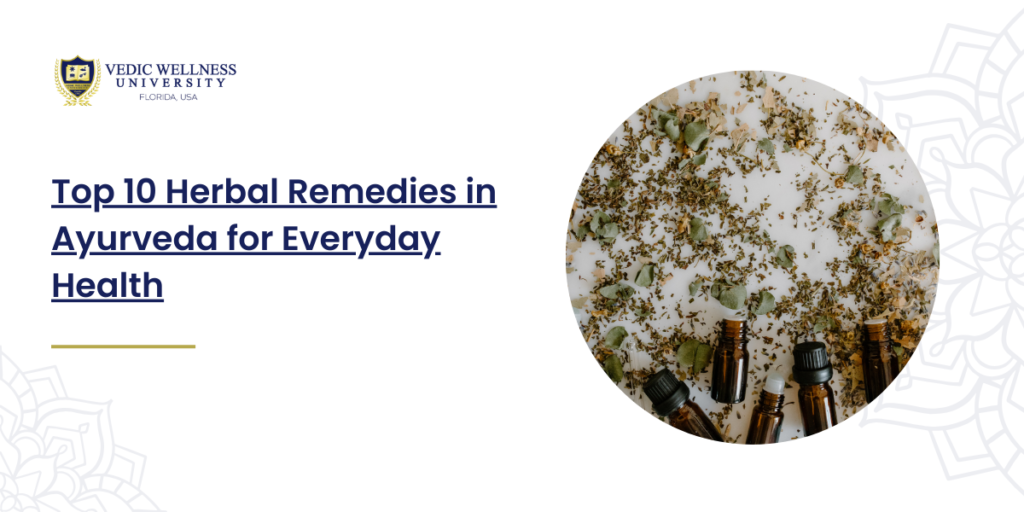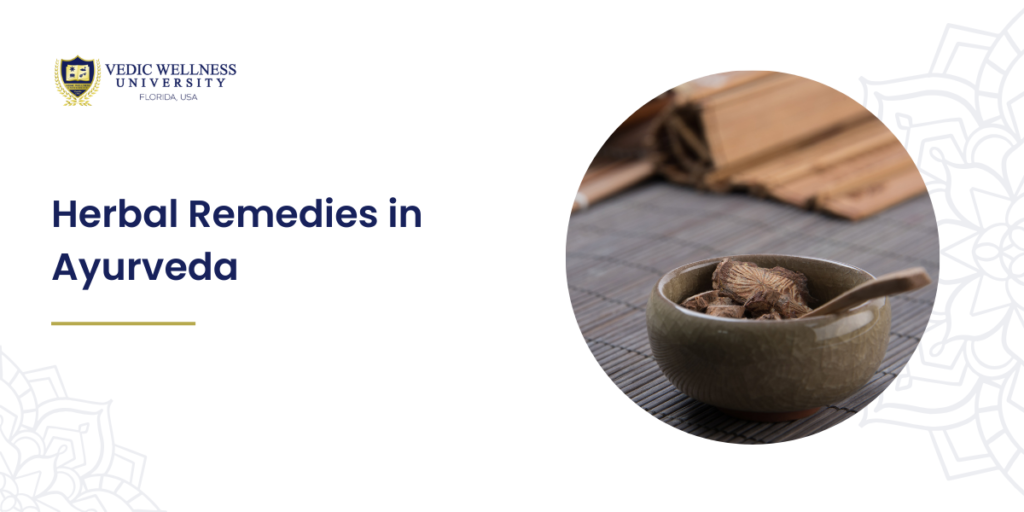Top 10 Herbal Remedies in Ayurveda for Everyday Health

Introduction “सर्वे भवन्तु सुखिनः, सर्वे सन्तु निरामयाः।”(Sarve Bhavantu Sukhinah, Sarve Santu Niramayah)“May all be happy, may all be free from disease.” This ancient shloka encapsulates the essence of Ayurveda, the traditional Indian system of medicine that aims to promote health and well-being for all. Ayurveda, which means “the science of life,” is a holistic approach to health that emphasizes balance in the body, mind, and spirit. Central to Ayurvedic practice are herbal remedies, which have been used for thousands of years to treat a wide range of ailments and promote overall health. Importance of Herbal Remedies in Ayurveda Herbal remedies are a cornerstone of the Ayurvedic healthcare system. They are derived from various parts of plants, including leaves, roots, bark, seeds, and flowers, and are used to balance the body’s doshas (Vata, Pitta, and Kapha) and support the body’s natural healing processes. In Ayurveda, each herb has specific properties that can help in treating diseases, boosting immunity, and maintaining overall health. Herbal remedies are particularly valued for their natural origins and minimal side effects compared to synthetic medications. They are used to treat a wide variety of health conditions, from common colds and digestive issues to chronic diseases and mental health disorders. In addition to treating illnesses, Ayurvedic herbs are also used to enhance physical strength, mental clarity, and emotional stability. Vital Herbs Used in Ayurveda 1. Ashwagandha (Withania somnifera) Properties and Benefits: Ashwagandha, also known as Indian ginseng, is a powerful adaptogen that helps the body cope with stress. It enhances stamina, boosts immunity, and improves overall vitality. Uses: How to Use: Ashwagandha can be consumed as a powder mixed with milk or water, or taken in capsule form. It is commonly found in health food stores and Ayurvedic shops worldwide. 2. Turmeric (Curcuma longa) Properties and Benefits: Turmeric is renowned for its anti-inflammatory and antioxidant properties. The active compound, curcumin, is effective in reducing inflammation and supporting joint health. Uses: How to Use: Turmeric can be added to food as a spice or taken as a supplement in powder or capsule form. It is widely available in grocery stores and herbal shops. 3. Tulsi (Ocimum sanctum) Properties and Benefits: Tulsi, or holy basil, is revered in Ayurveda for its medicinal properties. It is a powerful adaptogen that supports respiratory health and reduces stress. Uses: How to Use: Tulsi leaves can be brewed as tea, used in cooking, or taken as a supplement. It is commonly available in health food stores and Ayurvedic shops. 4. Ginger (Zingiber officinale) Properties and Benefits: Ginger is widely used in Ayurveda for its digestive and anti-inflammatory properties. It aids digestion, reduces nausea, and supports cardiovascular health. Uses: How to Use: Ginger can be consumed fresh, as a tea, or in powdered form. It is readily available in grocery stores and herbal shops. 5. Neem (Azadirachta indica) Properties and Benefits: Neem is known for its antibacterial, antifungal, and antiviral properties. It supports skin health and detoxifies the body. Uses: How to Use: Neem can be used in various forms, including capsules, powders, oils, and soaps. It is available in Ayurvedic and health food stores. 6. Amla (Emblica officinalis) Properties and Benefits: Amla, or Indian gooseberry, is rich in vitamin C and antioxidants. It supports immune function and enhances skin and hair health. Uses: How to Use: Amla can be consumed fresh, as juice, or in powdered form. It is widely available in health food stores and Ayurvedic shops. 7. Brahmi (Bacopa monnieri) Properties and Benefits: Brahmi is a powerful herb for cognitive enhancement. It improves memory, reduces stress, and supports mental clarity. Uses: How to Use: Brahmi can be taken as a supplement in capsule or powder form, or brewed as tea. It is available in health food stores and Ayurvedic shops. 8. Triphala Properties and Benefits: Triphala is a combination of three fruits: Amla, Haritaki, and Bibhitaki. It supports digestive health and detoxification. Uses: How to Use: Triphala is commonly taken as a powder mixed with water or as a capsule. It is available in Ayurvedic and health food stores. 9. Shatavari (Asparagus racemosus) Properties and Benefits: Shatavari is known for its benefits in women’s health. It supports reproductive health, balances hormones, and enhances lactation. Uses: How to Use: Shatavari can be taken as a powder mixed with milk or water, or as a supplement in capsule form. It is available in health food stores and Ayurvedic shops. 10. Licorice (Glycyrrhiza glabra) Properties and Benefits: Licorice is known for its soothing properties. It supports respiratory health, soothes the digestive tract, and reduces inflammation. Uses: How to Use: Licorice can be consumed as tea, in powder form, or as a supplement. It is available in health food stores and Ayurvedic shops. Top 10 Herbal Remedies in Ayurveda 1. Ashwagandha for Stress and Anxiety Where to Find: Ashwagandha is widely available in health food stores, Ayurvedic shops, and online retailers. How to Take: Diseases it Can Cure: Other Details: Ashwagandha’s adaptogenic properties make it an excellent remedy for reducing stress and anxiety. It also supports overall vitality and strengthens the immune system. For best results, it is recommended to take Ashwagandha daily, preferably in the evening. 2. Turmeric for Inflammation and Joint Health Where to Find: Turmeric is commonly found in grocery stores, health food stores, and online retailers. How to Take: Diseases it Can Cure: Other Details: The active compound in turmeric, curcumin, is known for its potent anti-inflammatory and antioxidant properties. Regular consumption of turmeric can help reduce inflammation, support joint health, and improve digestive function. It is often recommended to take turmeric with black pepper to enhance its absorption. 3. Tulsi for Respiratory Health and Immune Support Where to Find: Tulsi is available in health food stores, Ayurvedic shops, and online retailers. How to Take: Diseases it Can Cure: Other Details: Tulsi, also known as holy basil, is revered in Ayurveda for its adaptogenic and immune-boosting properties. It supports respiratory health, reduces stress, and enhances digestion. Tulsi tea can be consumed
Herbal Remedies in Ayurveda: Natural Solutions for Common Ailments

Ayurveda, the ancient system of medicine from India, has long emphasized the healing power of herbs. At Vedic Wellness University, we integrate traditional Vedic knowledge with modern practices to provide a holistic education in natural health solutions. This blog explores the benefits of herbal remedies in Ayurveda and their effectiveness in treating common ailments. The Foundations of Ayurveda Ayurveda, which translates to “the science of life,” is based on balancing the body, mind, and spirit. It categorizes individuals into three doshas: Vata, Pitta, and Kapha. Imbalance in these doshas leads to illness, and Ayurvedic treatments, including herbal remedies, aim to restore this balance. “Swasthasya swasthya rakshanam aturasya vikar prashamanam cha”(To protect the health of the healthy and to alleviate the disorders of the sick.)– Charaka Samhita Benefits of Herbal Remedies in Ayurveda Herbal remedies in Ayurveda are derived from plants and natural substances, offering a safe and effective way to treat various health conditions. These remedies are known for their minimal side effects and holistic approach to healing. Common Ailments and Ayurvedic Solutions 1. Digestive Issues Digestive problems like indigestion, bloating, and constipation are common. Ayurveda recommends herbs such as ginger, fennel, and Triphala to improve digestion and relieve discomfort. “Aharaparinam karanam jeernam pachan sevanat”(Food is digested and assimilated due to the action of digestive enzymes.)– Sushruta Samhita 2. Respiratory Conditions Herbs like Tulsi (Holy Basil), Licorice, and Turmeric are effective in treating respiratory issues such as asthma, bronchitis, and cough. Tulsi, known for its anti-inflammatory and antibacterial properties, is especially beneficial. 3. Skin Disorders Ayurvedic herbs such as Neem, Aloe Vera, and Turmeric are widely used to treat skin conditions like acne, eczema, and psoriasis. These herbs possess anti-inflammatory, antimicrobial, and healing properties. Integrating Herbal Remedies into Daily Life Incorporating herbal remedies into your daily routine can promote overall health and prevent illnesses. Simple practices like drinking herbal teas, using herbal supplements, and applying herbal oils can make a significant difference. 4. Stress and Anxiety Ashwagandha and Brahmi are potent herbs used in Ayurveda to combat stress and anxiety. These adaptogenic herbs help regulate the body’s stress response and promote mental clarity and relaxation. “Prasanna atma indriya manah swastha iti abhidhiyate”(Health is a state of complete physical, mental, and social well-being.)– Sushruta Samhita Global Acceptance and Research The efficacy of herbal remedies in Ayurveda is increasingly recognized worldwide. Research studies have validated the benefits of Ayurvedic herbs, leading to their integration into modern healthcare systems. Countries such as the USA, Canada, and Australia have seen a rise in the popularity of Ayurvedic treatments. Learning Ayurveda at Vedic Wellness University Vedic Wellness University offers a comprehensive curriculum in Ayurveda, including the study of herbal remedies. Our programs are designed to provide students with in-depth knowledge and practical skills to apply Ayurvedic principles in their lives and careers. Conclusion Herbal remedies in Ayurveda offer natural and effective solutions for common ailments, emphasizing the importance of balance and holistic health. At Vedic Wellness University, we are committed to preserving and promoting this ancient wisdom, integrating it with modern practices to provide a comprehensive education in natural health. Embrace the healing power of Ayurveda and discover the benefits of herbal remedies for yourself. For those interested in exploring this ancient science, Vedic Wellness University provides the ideal platform to learn and grow. Join us and discover the profound impact of Ayurveda on your health and well-being.

